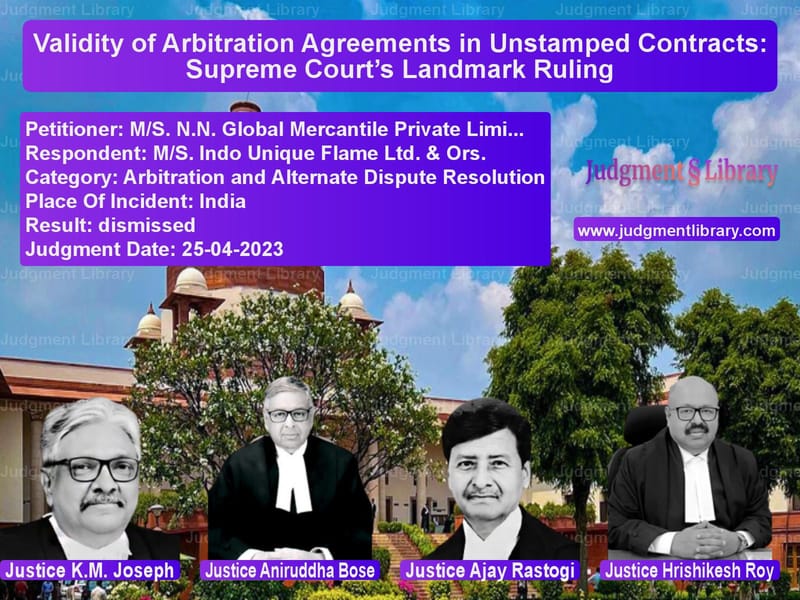Validity of Arbitration Agreements in Unstamped Contracts: Supreme Court’s Landmark Ruling
The Supreme Court of India, in the case of M/S. N.N. Global Mercantile Private Limited v. M/S. Indo Unique Flame Ltd. & Ors., addressed a significant question regarding arbitration agreements contained in unstamped contracts. The central issue revolved around whether an arbitration agreement embedded within an unstamped contract could be considered valid and enforceable under Indian law.
This judgment has far-reaching implications for arbitration law and contractual enforcement in India. It clarifies the interplay between the Arbitration and Conciliation Act, 1996, and the Indian Stamp Act, 1899. The ruling reinforces the importance of stamp duty compliance and outlines the responsibilities of courts in handling arbitration agreements within unstamped contracts.
Background of the Case
The case originated from a commercial dispute between the appellant, N.N. Global Mercantile Private Limited, and the respondent, Indo Unique Flame Ltd. The dispute arose from a sub-contract that contained an arbitration clause. However, the contract was not stamped, leading to questions about the validity and enforceability of the arbitration clause.
The respondent contended that since the main contract was unstamped, the arbitration agreement contained within it was unenforceable. The appellant, on the other hand, argued that an arbitration agreement is an independent contract that should be enforceable regardless of the stamping status of the main agreement.
Legal Issues and Questions Before the Court
The Supreme Court had to determine the following key legal questions:
- Does an arbitration agreement in an unstamped contract have legal existence?
- Can an arbitration agreement be enforced independently, even if the main contract is unstamped?
- What is the impact of the Indian Stamp Act, 1899, on arbitration agreements?
- Should courts impound unstamped contracts containing arbitration clauses before referring disputes to arbitration?
Arguments by the Petitioner (Appellant)
The appellant advanced the following arguments in favor of enforcing the arbitration agreement:
- Doctrine of Separability: “An arbitration agreement is independent of the main contract. Even if the main contract is invalid or unenforceable, the arbitration agreement should still be valid.”
- Limited Court Intervention: “The Arbitration and Conciliation Act, 1996, promotes minimal judicial interference in arbitration matters. Courts should not refuse to enforce arbitration agreements based on stamping issues.”
- Stamp Act is a Fiscal Law: “The Indian Stamp Act is meant to collect revenue and should not be used to invalidate contracts or arbitration agreements.”
- Role of the Arbitral Tribunal: “It should be for the arbitral tribunal, not the courts, to decide the validity of the arbitration agreement.”
Arguments by the Respondent
The respondent countered the appellant’s arguments, stating:
- Non-Stamping Renders the Contract Inadmissible: “Section 35 of the Indian Stamp Act bars unstamped documents from being admitted in evidence or acted upon.”
- Arbitration Clause is Part of the Contract: “Since the arbitration clause is embedded within the contract, it cannot exist separately if the contract itself is legally unenforceable.”
- Mandatory Compliance with Stamp Act: “Stamp duty is a legal obligation, and courts cannot ignore unstamped documents.”
- Judicial Responsibility: “It is the duty of the courts to ensure that contracts comply with stamp duty requirements before allowing them to be enforced.”
Supreme Court’s Analysis and Judgment
After reviewing arguments from both parties, the Supreme Court made the following observations:
- Importance of the Stamp Act: “The Indian Stamp Act is a fiscal law that must be complied with before a contract can be enforced. An unstamped contract cannot be acted upon until the required duty is paid.”
- Arbitration Clause Cannot Exist Independently: “Since the arbitration agreement is part of the main contract, it cannot have an independent existence if the contract itself is unenforceable due to non-stamping.”
- Role of the Court: “Courts have a duty to impound unstamped documents under Section 33 of the Indian Stamp Act and ensure proper stamping before allowing them to be enforced.”
- Precedents Overruled: “The judgments in SMS Tea Estates and Garware Wall Ropes were reaffirmed, confirming that an arbitration agreement in an unstamped contract is unenforceable until the required stamp duty is paid.”
The Supreme Court dismissed the appeal and held that an arbitration agreement contained in an unstamped contract is invalid until the required stamp duty is paid. The judgment reinforces the legal requirement that all contracts, including arbitration agreements, must comply with the Indian Stamp Act before they can be enforced.
Key Takeaways from the Judgment
- Unstamped contracts, including arbitration clauses within them, are legally unenforceable until duly stamped.
- The Stamp Act applies to all agreements and prevents their use in legal proceedings unless properly stamped.
- Court intervention is necessary to ensure compliance with the Stamp Act before arbitration proceedings can commence.
- An arbitration agreement does not have an independent existence if it is part of an unstamped contract.
- Litigants must ensure their contracts are duly stamped before seeking to enforce arbitration clauses.
Impact on Arbitration Law in India
This ruling has a significant impact on arbitration law in India:
- Greater Compliance with Stamp Act: Businesses and individuals must ensure their contracts are properly stamped before seeking legal enforcement.
- Increased Judicial Oversight: Courts must verify compliance with stamp duty requirements before allowing arbitration proceedings to commence.
- Potential Delays in Arbitration: Parties must address stamping issues before arbitration can proceed, potentially causing delays.
- Clarification of Legal Principles: The judgment clarifies that arbitration agreements are not immune from statutory compliance requirements.
Ultimately, the ruling upholds the legal principle that all contracts, including those with arbitration clauses, must comply with the Stamp Act before they can be enforced. This ensures a fair and legally sound arbitration process while maintaining the integrity of statutory requirements.
Petitioner Name: M/S. N.N. Global Mercantile Private Limited.Respondent Name: M/S. Indo Unique Flame Ltd. & Ors..Judgment By: Justice K.M. Joseph, Justice Aniruddha Bose, Justice Ajay Rastogi, Justice Hrishikesh Roy.Place Of Incident: India.Judgment Date: 25-04-2023.
Don’t miss out on the full details! Download the complete judgment in PDF format below and gain valuable insights instantly!
Download Judgment: ms.-n.n.-global-mer-vs-ms.-indo-unique-fla-supreme-court-of-india-judgment-dated-25-04-2023.pdf
Directly Download Judgment: Directly download this Judgment
See all petitions in Arbitration Act
See all petitions in Commercial Arbitration
See all petitions in Enforcement of Awards
See all petitions in Dispute Resolution Mechanisms
See all petitions in Institutional Arbitration
See all petitions in Judgment by K.M. Joseph
See all petitions in Judgment by Aniruddha Bose
See all petitions in Judgment by Ajay Rastogi
See all petitions in Judgment by Hrishikesh Roy
See all petitions in dismissed
See all petitions in supreme court of India judgments April 2023
See all petitions in 2023 judgments
See all posts in Arbitration and Alternate Dispute Resolution Category
See all allowed petitions in Arbitration and Alternate Dispute Resolution Category
See all Dismissed petitions in Arbitration and Alternate Dispute Resolution Category
See all partially allowed petitions in Arbitration and Alternate Dispute Resolution Category







